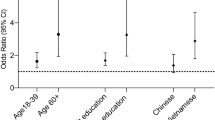Abstract
This study examines associations and potential interactions between race/ethnicity, workplace racial discrimination, depression, and negative emotional symptoms experienced due to treatment based on race. Data for this study come from the 2014 Behavioral Risk Factor Surveillance System (BRFSS), an annual telephone survey of US residents, aged 18 and older. Respondents from MN and NM (n = 13,655) completed a module titled Reactions to Race, which contained items assessing workplace racial discrimination and negative emotions experienced based on treatment due to race, as well as standard BRFSS items assessing a diagnosis of depression. Results support previous research concluding that non-Hispanic White survey respondents are less likely to experience racial discrimination in the workplace than other race/ethnicity groups, but were more likely to report both depression and negative emotions. Analyses stratified by race/ethnic group suggest that, after controlling for gender, marital status, education, and income, there was an association between experiencing workplace racial discrimination and reporting negative emotions due to treatment based on race (all p values < 0.001). Of note, this association was strongest for non-Hispanic White respondents.
Similar content being viewed by others
Change history
27 February 2019
Please note that the name of coauthor Shauna Carlisle was presented incorrectly in this article as published: The correct rendering of her name is Carlisle, S.K. (instead of the incorrect rendering of Carlisle, S.E., which incorrectly notes E. [surname] as her middle initial).
References
Pascoe E, Smart Richman L. Perceived discrimination and health: a meta-analytic review. Psychol Bull. 2009;135(4):531–54.
Schulz A, Gravlee C, Williams D, Israel B, Mentz G, Rowe Z. Discrimination, symptoms of depression, and self-rated health among African American women in Detroit: results from a longitudinal analysis. Am J Public Health. 2005;96(7):1265–70.
Chavez LJ, Ornelas IJ, Lyles CR, Williams EC. Racial/ethnic workplace discrimination. Am J Prev Med. 2015;48(1):42–9.
Equal Employment Opportunity Commission (EEOC) (2017). Charge statistics FY 2016. Retrieved January 12, 2018, from https://www1.eeoc.gov/eeoc/statistics/enforcement/state_16.cfm
Center for Behavioral Health Statistics and Quality. 2016 National Survey on Drug Use and Health: detailed tables. Rockville: Substance Abuse and Mental Health Services Administration; 2017.
Budhwani H, Hearld KR, Chavez-Yenter D. Depression in racial and ethnic minorities: the impact of nativity and discrimination. J Racial Ethn Health Disparities. 2015;2:34–42.
Assari S, Watkins DC, Caldwell CH. Race attribution modifies the association between daily discrimination and major depression among Blacks: the role of gender and ethnicity. J Racial Ethn Health Disparities. 2015;2:200–10.
Miller CT, Kaiser CR. A theoretical perspective on coping with stigma. J Soc Issues. 2001;57:73–92.
Armstead CA, Lawler KA, Gorden G, Cross J, Gibbons J. Relationship of racial stressors to blood pressure responses and anger expression in Black college students. Health Psychol. 1989;8(5):541–56.
Feagin JR, Sikes MP. Living with racism: the Black middle-class experience. Boston: Beacon; 1994.
Shazo Z, Richie WD, Bailey RK. Racial and ethnic disparity in major depressive disorder. J Racial Ethn Health Disparities. 2016;3(4):692–705.
Williams DR, Yan Y, Jackson JS, Anderson NB. Racial differences in physical and mental health: socioeconomic status, stress and discrimination. Journal of Health Psychology. 1997;2:335–51. https://doi.org/10.1177/135910539700200305.
Nunez-Smith M, Pilgrim N, Wynia M, Desai MM, Jones BA, Bright C, et al. Race/ethnicity and workplace discrimination: results of a national survey of physicians. J Gen Intern Med. 2009;24(11):1198–204.
Brouwers EPM, Mathijessen J, Van Bortel T, Knifton L, Wahlbeck K, Van Audenhove C, et al. The ASPEN/INDIGO Study Group. Discrimination in the workplace, reported by people with major depressive disorder: a cross-sectional study in 35 countries. BMJ Open. 2016;6:e009961. https://doi.org/10.1136/bmjopen-2015-009961.
Deitch EA, Barsky A, Butz RM, Chan S, Brief AP, Bradley JC. Subtle yet significant: the existence and impact of everyday racial discrimination in the workplace. Hum Relat. 2003;56(11):1299–324.
Powell Hammond W, Gillen M, Yen IH. Workplace discrimination and depressive symptoms: a study of multi-ethnic hospital employees. Race Soc Probl. 2010;2(1):19–30.
Stainback K, Irvin M. Workplace racial composition, perceived discrimination, and organizational attachment. Soc Sci Res. 2012;41:657–70.
Thrasher AD, Wells AM, Spencer SM, Cofie L, Yen IH. Workplace discrimination is associated with alcohol abuse among ethnically diverse hospital staff. Workplace Health Saf. 2016;64(5):202–9.
Fernando S. Racism as a cause of depression. Int J Soc Psychiatry. 1984;301:41.
Centers for Disease Control and Prevention (CDC) (2015). Behavioral risk factor surveillance system overview: BRFSS 2014. Retrieved January 13, 2018, from https://www.cdc.gov/brfss/annual_data/2014/pdf/overview_2014.pdf
Williams DR, Gonzalez HM, Neighbors H, Nesse R, Abelson JM, Sweetman J, et al. Prevalence and distribution of major depressive disorder in African Americans, Caribbean Blacks, and non-Hispanic Whites: results from the National Survey of American Life. Arch Gen Psychiatry. 2007;64(3):305–15.
Armstrong K, Putt M, Hughes Halbert C, Grande D, Sanford Schwartz J, Shea J. Prior experiences of racial discrimination and racial differences in health care system distrust. Med Care. 2013;51(2):144–50.
Martin A, Boadi N, Fernandes C, Watt S, Robinson-Wood. Applying resistance theory to depression in Black women. Journal of Systemic Therapies. 2013;32(1):1–13.
Lindsey M, Chambers K, Pohle C, Beall P, Lucksted A. Understanding the behavioral determinants of mental health service use by urban, under-resourced Black youth: adolescent and caregiver perspectives. J Child Fam Stud. 2013;22(1):107–21. https://doi.org/10.1007/s10826-012-9668-z.
Snowden L. Barriers to effective mental health services for African Americans. Ment Health Serv Res. 2001;3:181–7.
Snowden L. Bias in mental health assessment and intervention. Theory and evidence. Am J Public Health. 2003;93(2):239–43.
DiAngelo R. White fragility. Int J Crit Pedagog. 2011;3(3):54–70.
Author information
Authors and Affiliations
Corresponding author
Ethics declarations
Conflict of Interest
The authors of this work, Andrea L. Stone and Shauna Elbers Carlisle, declare that they have no conflicts of interest.
Informed Consent
All procedures performed in this study were in accordance with the ethical standards of the University of Washington Institutional Review Board and with the 1964 Helsinki declaration and its later amendments or comparable ethical standards.
Rights and permissions
About this article
Cite this article
Stone, A.L., Carlisle, S.E. Examining Race/Ethnicity Differences in the Association Between the Experience of Workplace Racial Discrimination and Depression or Negative Emotions. J. Racial and Ethnic Health Disparities 6, 874–882 (2019). https://doi.org/10.1007/s40615-018-0524-8
Received:
Revised:
Accepted:
Published:
Issue Date:
DOI: https://doi.org/10.1007/s40615-018-0524-8




